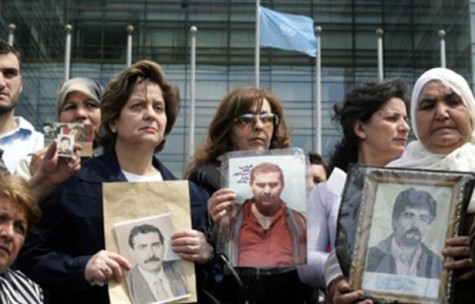Christalla Yakinthou of the University of Birmingham has written a 34-page report for the International Center for Transitional Justice on the continuing plight of women whose husbands went missing during Lebanon’s civil war from 1975 to 1990.
For 25 years, more than 600 families have demanded authorities reveal the fate of thousands of men who disappeared in the conflict. Successive Lebanese Governments have said they would address the issue, even including it in Cabinet programs, but families of the victims say their appeals have often been met with apathy.
The report offers a series of recommendations to the Lebanese Government, the country’s communities, and international groups to ease the situation of the wives.
The report will be discussed on Monday at 5 p.m. at the Lebanese American University in Beirut, with presentations by Dr. Yakinthou, one of the wives, and representatives of local humanitarian organizations and the screening of a documentary.
The Executive Summary and Recommendations:
I knocked on everyone’s door….Whenever they told me there was hope, I used to run. To run. It has been 30 years. I knocked on many doors. And asked a lot…And they used to promise me, promise me, promise me…. — Samah A.
This report examines the impact on women of enforced disappearances that occurred during Lebanon’s civil war (1975–1990), focusing in particular on the effects on the wives of the missing or disappeared. The impact of enforced disappearance on women has been effectively hidden from the Lebanese public due to state policies of impunity and official forgetting. These crimes remain secret, and victims are denied their rights to truth and justice.
The report tells the stories of 23 wives of missing or disappeared persons interviewed for this study, who emphasized the social, psychological, legal, and financial effects of disappearance on their lives and the lives of their children. Their primary, and sometimes only, concern was to learn whether their husband was dead or alive, and if dead, to request a return of his body.
Not one has yet received clear information from the government about her husband’s fate.
These women, often trapped in the moment when their husband went missing, continue to exist in a state of social and legal limbo, living with the shadows of the past.
The wives of missing or disappeared persons in Lebanon endure practical, legal, and emotional hardship. Legal and administrative procedures such as accessing bank accounts, applying for children’s identity documents, claiming inheritance, transferring property titles, and remarriage are extremely difficult. If the missing person was the primary wage earner, financial hardship pervades the family’s daily life. Compounding these problems, families often experience isolation, intimidation, and extortion, sometimes at the hands of those responsible for committing the disappearance.
In seeking redress in a patriarchal environment, these women also have to negotiate a social and political context that is highly discriminatory toward them, contributing to the already overwhelming challenge of finding answers and support from relevant authorities. As victims and survivors of grave human rights violations whose basic rights have not been met, these women relay in this report their most pressing demands and views on their government. In a context of tremendous loss, what they ask for is a basic remedy. Without serious attention from senior Lebanese officials, this issue will continue to stall, leaving families in limbo and breaching their right to justice and truth.
The women interviewed for this study offered a number of concrete recommendations for how the issue of enforced disappearance should be addressed by Lebanese policy makers and civil society. While some of the recommendations require parliamentary support, others can be passed by ministerial initiatives.
Many participants identified the need for political support and assistance from the international community in finding ways to meet their right to justice and truth. Without such assistance, it is unlikely there will be sufficient impetus for the Lebanese state to take action and provide appropriate remedies.
RECOMMENDATIONS
To the Government
1. Create a legal certification of absence due to enforced disappearance.
2. Protect the burial sites.
3. Respect the families’ right to know the truth.
4. Grant the children of missing or disappeared non-Lebanese fathers the right to remain in the country without continuous residency permit renewals.
To Leaders of the Confessional Communities
5. Initiate discussions within confessional communities to explore ways in which additional support and mitigating remedies could be provided to families by the relevant community.
To International and Local Stakeholders
6. Conduct research on the precise nature of the medical and psychological needs of families of the missing and disappeared and how these can best be met within existing circumstances.

